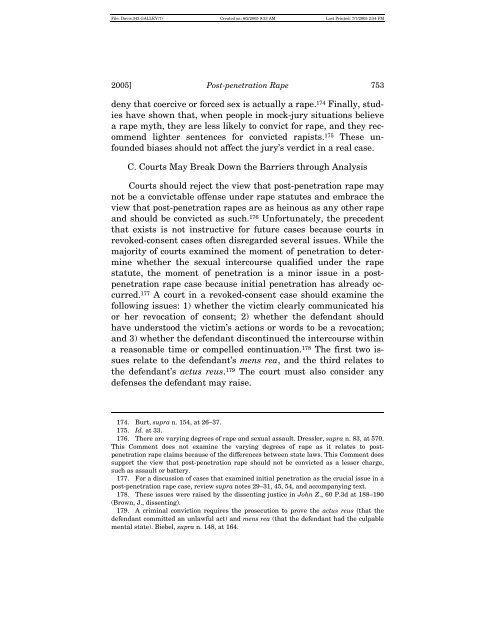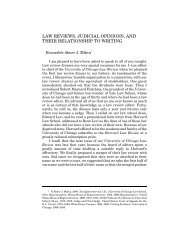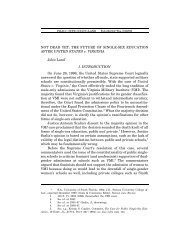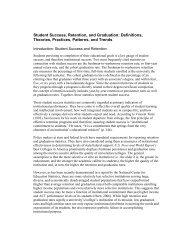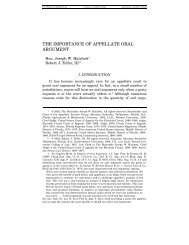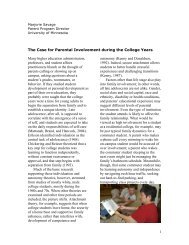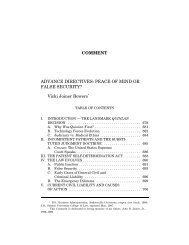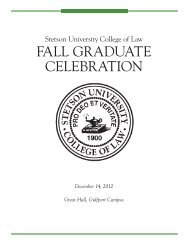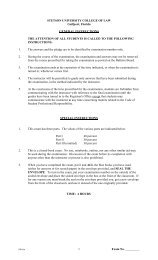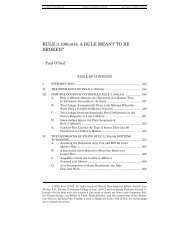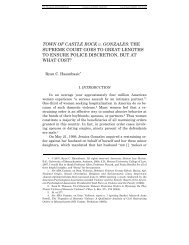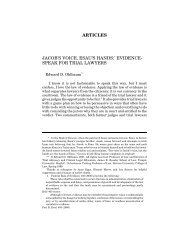the evolution of post-penetration rape law - Stetson University ...
the evolution of post-penetration rape law - Stetson University ...
the evolution of post-penetration rape law - Stetson University ...
You also want an ePaper? Increase the reach of your titles
YUMPU automatically turns print PDFs into web optimized ePapers that Google loves.
File: Davis.343.GALLEY(7) Created on: 6/2/2005 9:33 AM Last Printed: 7/7/2005 2:54 PM2005] Post-<strong>penetration</strong> Rape 753deny that coercive or forced sex is actually a <strong>rape</strong>. 174 Finally, studieshave shown that, when people in mock-jury situations believea <strong>rape</strong> myth, <strong>the</strong>y are less likely to convict for <strong>rape</strong>, and <strong>the</strong>y recommendlighter sentences for convicted rapists. 175 These unfoundedbiases should not affect <strong>the</strong> jury’s verdict in a real case.C. Courts May Break Down <strong>the</strong> Barriers through AnalysisCourts should reject <strong>the</strong> view that <strong>post</strong>-<strong>penetration</strong> <strong>rape</strong> maynot be a convictable <strong>of</strong>fense under <strong>rape</strong> statutes and embrace <strong>the</strong>view that <strong>post</strong>-<strong>penetration</strong> <strong>rape</strong>s are as heinous as any o<strong>the</strong>r <strong>rape</strong>and should be convicted as such. 176 Unfortunately, <strong>the</strong> precedentthat exists is not instructive for future cases because courts inrevoked-consent cases <strong>of</strong>ten disregarded several issues. While <strong>the</strong>majority <strong>of</strong> courts examined <strong>the</strong> moment <strong>of</strong> <strong>penetration</strong> to determinewhe<strong>the</strong>r <strong>the</strong> sexual intercourse qualified under <strong>the</strong> <strong>rape</strong>statute, <strong>the</strong> moment <strong>of</strong> <strong>penetration</strong> is a minor issue in a <strong>post</strong><strong>penetration</strong><strong>rape</strong> case because initial <strong>penetration</strong> has already occurred.177 A court in a revoked-consent case should examine <strong>the</strong>following issues: 1) whe<strong>the</strong>r <strong>the</strong> victim clearly communicated hisor her revocation <strong>of</strong> consent; 2) whe<strong>the</strong>r <strong>the</strong> defendant shouldhave understood <strong>the</strong> victim’s actions or words to be a revocation;and 3) whe<strong>the</strong>r <strong>the</strong> defendant discontinued <strong>the</strong> intercourse withina reasonable time or compelled continuation. 178 The first two issuesrelate to <strong>the</strong> defendant’s mens rea, and <strong>the</strong> third relates to<strong>the</strong> defendant’s actus reus. 179 The court must also consider anydefenses <strong>the</strong> defendant may raise.174. Burt, supra n. 154, at 26–37.175. Id. at 33.176. There are varying degrees <strong>of</strong> <strong>rape</strong> and sexual assault. Dressler, supra n. 83, at 570.This Comment does not examine <strong>the</strong> varying degrees <strong>of</strong> <strong>rape</strong> as it relates to <strong>post</strong><strong>penetration</strong><strong>rape</strong> claims because <strong>of</strong> <strong>the</strong> differences between state <strong>law</strong>s. This Comment doessupport <strong>the</strong> view that <strong>post</strong>-<strong>penetration</strong> <strong>rape</strong> should not be convicted as a lesser charge,such as assault or battery.177. For a discussion <strong>of</strong> cases that examined initial <strong>penetration</strong> as <strong>the</strong> crucial issue in a<strong>post</strong>-<strong>penetration</strong> <strong>rape</strong> case, review supra notes 29–31, 45, 54, and accompanying text.178. These issues were raised by <strong>the</strong> dissenting justice in John Z., 60 P.3d at 188–190(Brown, J., dissenting).179. A criminal conviction requires <strong>the</strong> prosecution to prove <strong>the</strong> actus reus (that <strong>the</strong>defendant committed an un<strong>law</strong>ful act) and mens rea (that <strong>the</strong> defendant had <strong>the</strong> culpablemental state). Biebel, supra n. 148, at 164.


